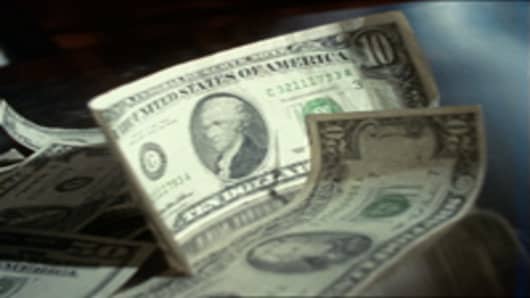The dollar eased Monday amid fears U.S. financial sector turmoil may last longer and exert more pressure on the already fragile economy, limiting the Federal Reserve's ability to raise interest rates by year-end.
Investors were reminded that the credit squeeze was far from over as Merrill Lynch said Lehman Brothers Holdings, may post a loss in the third quarter and take an additional $2.5 billion write-down on home loans for the period. On Friday, regulators seized two U.S. banks.
Meanwhile, Minneapolis Fed President Gary Stern said in a newspaper interview published on Monday that the headwind to U.S. economic growth was picking up a little steam.
"Stern's comments indicate the deterioration in the credit crunch with more certainty than they do regarding increased inflation. The remarks are rather dovish," said Ashraf Laidi, chief FX strategist at CMC Markets in New York.
"The Fed remains not only handicapped in raising interest rates but at risk of prolonging the credit slump and prompting a contraction of economic growth."
The New York Board of Trade's dollar index, which tracks the greenback's performance against a basket of six major currencies, dropped as low as 72.609. It last hovered around 72.684, down 0.2 percent on the day.
Worries over outlook for the the U.S. financial sector dragged Wall Street stocks lower, pulling the dollar down from a one-month high scaled earlier against the Japanese yen at 108.08 yen. The dollar was last quoted at 107.51 yen, down 0.3 percent.
The euro shrugged off a report showing that German consumer sentiment hit a five-year low, rising as high as $1.5768, but analysts said the market lacked enthusiasm to push the single euro zone currency above $1.60.
Systemic Risk Worry
"Despite very negative data over the last several days, the euro has surprisingly held its ground. The primary reason for that is the market is very much worried about systemic risk in the U.S. finanical system," said Boris Schlossberg, senior currency strategist at DailyFX.com.
"I don't think the euro has any real chance of exceeding $1.60, unless we get significantly worse news from the U.S., some major bankruptcy or systemic failure that happens," he added.
The euro last traded 0.2 percent higher at $1.5742.
Analysts said signs that the fallout from the U.S. credit crisis was spreading to Europe, Australia and New Zealand, meant traders were not keen to aggressively buy the euro and other high-yielding currencies.
"Overall, the euro bulls are a bit reluctant to engage in a strong rally after the recent spate of weak economic data," said Matthew Strauss, senior currency strategist at RBC Capital Markets in Canada.
British house prices fell for a tenth straight month in July to record their biggest annual fall since the survey by property consultants Hometrack began in 2001, a report showed on Monday.
That caused the euro to rise to a session high of 0.7933 against sterling, before retreating to last trade at 0.7897, up 0.1 percent on the day.
Unexpectedly strong New Zealand trade data lifted the kiwi 0.5 percent to $0.7445, but it stayed near the six-month trough it traded at last Thursday of $0.7387.
Market focus this week will shift to a deluge of data, particularly second-quarter U.S. GDP on Thursday and Friday's U.S. jobs figures.


